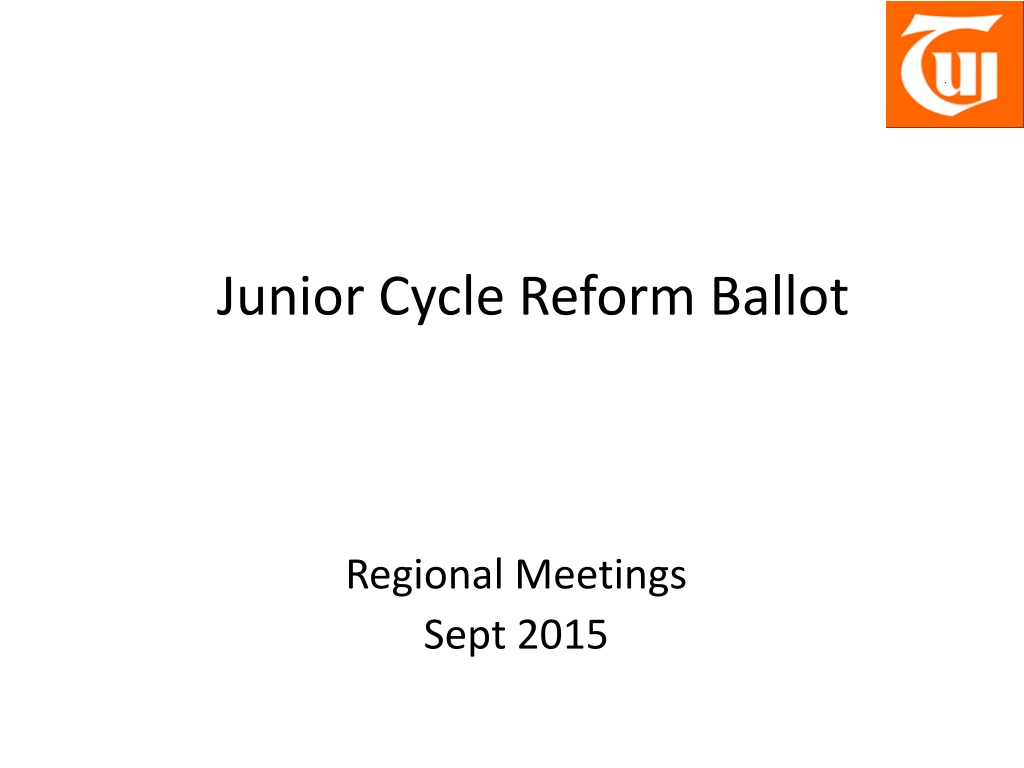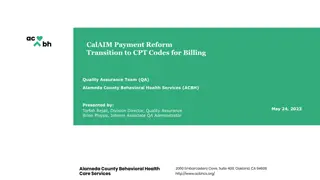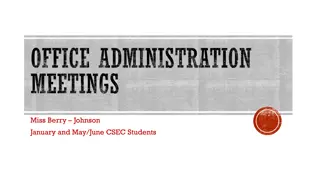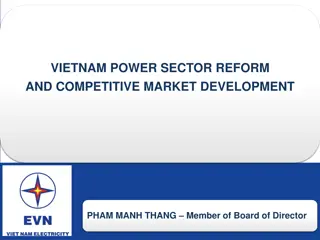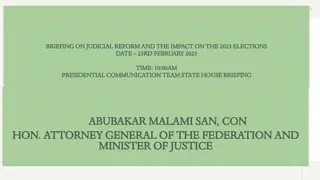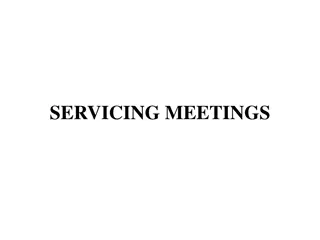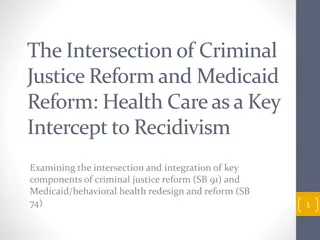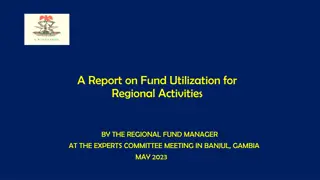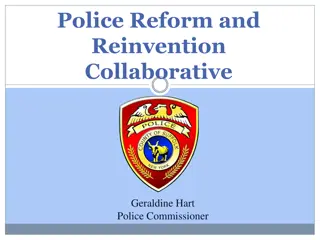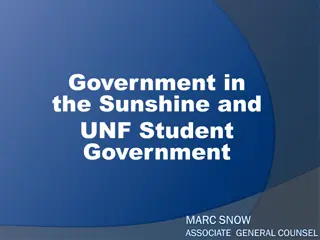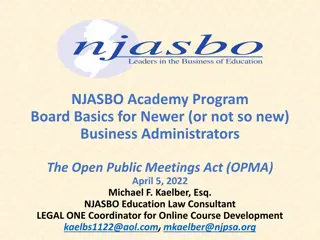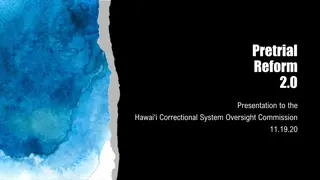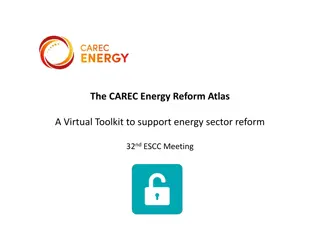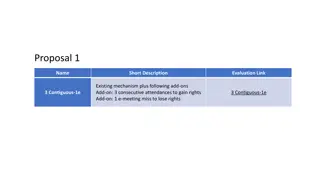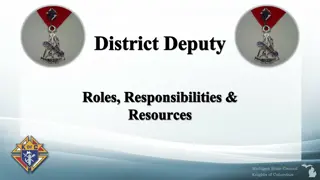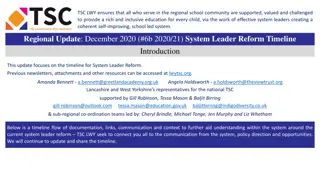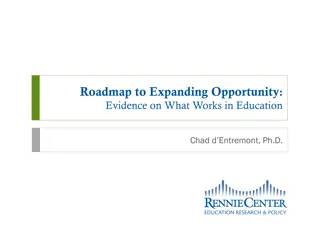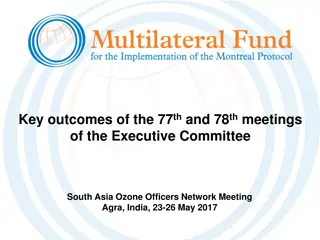Junior Cycle Reform Ballot Regional Meetings Summary
The Junior Cycle Reform Ballot Regional Meetings held in September 2015 highlighted key changes in the education system. It emphasized a maximum of 10 subjects for state certification, including English, Irish, and Maths with specified learning hours. Well-being components were made mandatory, with a focus on PE, SPHE, and CSPE. The inclusion of short courses and Level 2 options, along with guidelines for classroom periods, formative assessments, and assessments such as Classroom Based Assessments, were also discussed.
Download Presentation

Please find below an Image/Link to download the presentation.
The content on the website is provided AS IS for your information and personal use only. It may not be sold, licensed, or shared on other websites without obtaining consent from the author. Download presentation by click this link. If you encounter any issues during the download, it is possible that the publisher has removed the file from their server.
E N D
Presentation Transcript
Junior Cycle Reform Ballot Regional Meetings Sept 2015
Joint Statement on Principles and Implementation Appendix Professional Time to Support Implementation
Subjects Maximum of 10 subjects for state certification English, Irish and Maths 240 hours of learning All other subjects 200 hours of learning (Hours comprehend the undertaking of Classroom Based Assessments and Assessment Task) Well-Being (in addition to the max of 10 subjects) Mandatory and will include PE (200 hours), SPHE (Incorporating RSE) and CSPE 400 hours available for well-being over the 3 years of JC NCCA will advise on appropriate assessment of Well-Being Current CSPE will be retained until 2019 and can be taught in addition to the 10 subjects if the school chooses Subject Specification as opposed to syllabus CPD will be provided lessons have been learned from CPD already delivered to teachers of English. In addition, teacher feedback on CPD will be captured and collated Exemplar materials and complementary online support will be provided.
Short Courses & Level 2 Short Courses Schools may, but are not obliged to offer short courses assessed through CBA i.e. reported upon to parents/students by the school 100 hours of learning The DES and the document state that short courses should not undermine or replace existing subjects a Department of Education and Skills CL will issue, if necessary A student may take a maximum of 4 short courses e.g. 8 subjects and 4 short courses Level 2 Available for students with very significant special educational needs Priority Learning Units (PLU)
Class duration Duration of Class Periods Class periods of at least 40 minutes duration Schools will move to 40 min class periods as soon as it is practicable to do so
Classroom Based Assessment Formative Assessment Further integration of formative assessment teachers and students reflecting on how learning is progressing and deciding what next steps should be taken to ensure successful outcomes How is this supported? Classroom Based Assessments Classroom Based Assessments do not form any part of State Certification Teachers will not be assessing their own students for State Certification
Classroom Based Assessments (CBAs) Classroom Based Assessments (CBAs) (Forms no part of state certification) Two Classroom Based Assessments one in second year and one in third year A range/menu of CBAs set annually by the NCCA in consultation with SEC Teacher selects the appropriate CBA (from the menu) for her/his students Examples include Projects, Oral Tasks, Practical work, Investigations, etc. Undertaken in defined period of time within class contact time to a centrally set national timetable Reported upon to parents using standard descriptors (not marks) NCCA will outline and provide examples of standards of performance at different levels Will replace current assessment events in schools such as in-house exams Teachers of English First CBA can be undertaken in Spring 2016 or Autumn 2016
Subject Learning and Assessment Review (SLAR) Subject Learning and Assessment Review (SLAR) All teachers of each subject will engage in a SLAR meeting (specific to the subject and year group) after each CBA Share and discuss students work Discussion on standards Not a moderation meeting No external monitoring or report If you are the single teacher of a subject in the school you can be facilitated in attending a SLAR in a nearby school
Assessment Task (AT) Following the 3rdYear CBA there will be a formal written Assessment Task Manageable and short Undertaken in class and supervised by the teacher Not marked or commented upon by the teacher Examples of AT written demonstration of the knowledge and skills learned in CBA, identification of learning points, identification of areas of improvement etc. Submitted to the SEC and marked along with the terminal exam in each subject The weighting for the AT for each subject will be determined as each subject specification is developed
Assessment Task (AT) Art, Music, Home Economics and Technology subjects The second CBA in the 3rdyear will be reported upon to parents The artefact/performance/project work created (2ndCBA) will be marked by the SEC. The artefact/performance/project work, together with relevant written evidence, will be the AT
State Certified Exam Terminal Exam State Certified Externally set and marked by the SEC Undertaken in June in third year Invigilated by the SEC Exams no longer than 2 hour duration Reported on in September by the SEC using grades as at the present time Same appeal mechanism as is currently in place
Retention of State Certificate Retention of State Certificate State Certificate = SEC Junior Cycle results SEC will issue results of the JC that will encompass the result of the Assessment Task and the terminal exam. This is the full extent of what is state certified (SEC) Results issue as at present (Sept of the year following the sitting of the Examination)
Reporting Existing Arrangements New JC Oral feedback to students on progress Oral feedback to students on progress Parent Teacher Meetings Parent Teacher meetings School reports School reports that will use a standard reporting template devised by the NCCA. These will now include descriptors on the CBAs not grades or marks Junior Cycle Profile of Achievement (JCPA) - Is not a State Certificate - Is a report issued by school - Issues before end-December following completion of 3rdyear - Will report on the different assessment elements undertaken over the 3 years e.g. CBAs, learning arising from short courses or PLUs etc - Report includes SEC grades (already issued by the SEC in Sept)
School Reports NCCA is to devise standard reporting templates Appropriate to second level context User friendly and easily interpreted by students and parents Not requiring extensive discursive description Practical and easy to complete Available in hard copy and in electronic form In-built, drop-down menus and a library of appropriate standard descriptors (no grades or marks) Unions will be consulted regarding templates.
Professional Time Time secured by TUI All schools will get one day (6 hours) whole school planning within the 167 days commencing in 2015/2016 and running until June 2022 CL 20/2014 To be facilitated by school closure in line with terms of CL In addition, each teacher on 18 hours or more will get a 22 hour annual reduction in class contact time to facilitate professional time within timetabled hours. Part time teachers will get a pro rata reduction
Professional time p.a. - Class periods ( x 40 min) 17 17 18 18 19 20 21 21 22 23 Professional Time: Total p.a. Teaching Contract 11 hours or less 11h 1 min - 11h 29 min 11h 30 min - 11h 59 min 12 hours - 12h 29 min 12h 30 min - 12h 59 min 13 hours - 13h 29 min 13h 30 min - 13h 59 min 14 hours - 14h 29 min 14h 30 min - 14h 59 min 15 hours - 15h 29 min 11 hours, 20 min 11 hours, 20 min 12 hours 12 hours 12 hours, 40 min 13 hours, 20 min 14 hours 14 hours 14 hours, 40 min 15 hours, 20 min 15h 30 min - 15h 59 min 24 16 hours 16 hours - 16h 29 min 16h 30 min - 16h 59 min 17 hours - 17h 59 min 18 hours or more 24 25 26 33 16 hours 16 hours, 40 min 17 hours, 20 min 22 hours
Teaching Contract Class periods per annum (x 40 min) 17 Professional Time: Total p.a. 11 hours, 20 min 11 hours 29 min or less 11h 30 min - 12h 29 min 18 12 Hours 12h 30 min - 12h 59 min 19 12 hours, 40 min 13 hours - 13h 29 min 20 13 hours, 20 min 13h 30 min - 14h 29 min 21 14 hours 14h 30 min - 14h 59 min 22 14 hours, 40 min 15 hours - 15h 29 min 23 15 hours, 20 min 15h 30 min - 16h 29 min 24 16 hours 16h 30 min - 16h 59 min 25 16 hours, 40 min 17 hours - 17h 59 min 26 17 hours, 20 min 18 hours or more 33 22 hours
Professional Time In addition to the 22 hours professional time (or Pro-rata equivalent) One teacher will be given 2 additional hours to facilitate the preparation for and coordination of each SLAR meeting Rotated among the relevant teachers to build capacity Time for Administration of SEC Assessment Task Additional allocation of hours and necessary resources to school management to ensure secure administration of SEC Assessment Task. Therefore, administration of the AT will not create additional workload for the teacher or Principal teacher.
Professional Time Phasing of Time Allocation All time reductions take effect from the commencement of the 2017/2018 school year irrespective of whether or not your subject has been introduced Whole school day (under CL 20/2014) takes effect from 2015/2016 academic year
Professional Time Transitional Arrangement Teachers of English, Science & Business Existing New English 10 hours in 2015/2016 14 hours in 2016/2017 Additional paid substitution - not S&S Science 8 hours in 2016/2017 Additional paid substitution - not S&S 8 hours in 2016/2017 Additional paid substitution - not S&S Business Studies
How can 22 hours* Professional time be used? *pro rata for part time teachers SLAR meetings One for every subject and for every year group. Approx 2 hour duration. For example, if you teach: One subject for one year group 1 SLAR (2 hours of 22 hours* professional time) One subject for two year groups 2 SLARs (4 hours of 22 hours* professional time) Two subjects for one year group 2 SLARS (4 hours of 22 hours* professional time) Two subjects for two year groups 4 SLARS (8 hours of 22 hours* professional time)
How can 22 hours* Professional time be used? *pro rata for part time teachers Feedback Individual Teacher and Subject Department professional activity including: Assessment for Learning Feedback Reporting and Inputs compiled for the JCPA
Overview of Time Provided Expiration date Professional Time 22 hours Ongoing (or Part-time/pro-rata equivalent) + Whole School Planning 6 hours Annually until 2022 (school closure within 167 days) + Organising and Facilitating each SLAR 2 hours Ongoing (provided to one teacher) + Administration of Assessment Task Additional allocation of hours and resources to schools Ongoing
Implementation Committee Interpretation issues that arise will be referred to the Implementation Committee comprising representatives of TUI, ASTI and the DES.
Ballot Questions Ballot One: Do you accept the negotiated document entitled Junior Cycle Reform Joint Statement on Principles and Implementation (including the appendix Professional Time to Support Implementation ) as a basis for commencing implementation of the revised Junior Cycle? Yes/No Recommendation: The TUI Executive Committee recommends that you vote YES to the negotiated document and its Appendix
TUI Executive Committee Ballot Two: In the event that the negotiated document entitled Junior Cycle Reform Joint Statement on Principles and Implementation (including the appendix Professional Time to Support Implementation ) is not accepted by members, do you agree to continue industrial action up to and including strike action, as directed by the TUI Executive Committee? Yes/No Recommendation: The TUI Executive Committee recommends that you vote YES to Industrial Action in the event that the documents are not accepted
TUI Executive recommends that you VOTE YES In both ballots Joanne Irwin
